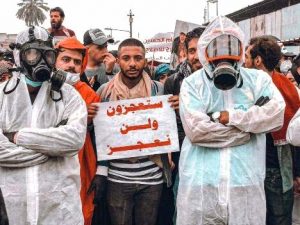On This Page:
Soldiers in India Discuss Communism ♦ Talking About Communism and the Coronavirus with Soldiers in Mexico ♦
Soldiers in India Discuss Communism
My father is an auto worker in South India. He works in a factory, but I grew up in a small village that is very poor. My father would send money every month to support the family. I only saw my father when he came home on holidays. When I was 18 years old, my family had no money to send me to school. I joined the Indian army.
Recently my father has been talking to me about communism and the organization International Communist Workers’ Party. He says there is a newspaper Red Flag. I found it on the internet when I am outside of the army on my days off.
I liked the articles about the students who are fighting in Delhi. In my barracks the situation is the same as the students face. The quality of our food is very poor.
We have very close friendship among the soldiers. When we started reading about coronavirus, the officers told us that we might have to go to the cities to maintain law and order. Then we heard that one soldier was infected with coronavirus. We are in a very close physical contact with each other and we are extremely concerned.
My father told me the stories of widespread rebellions in the Indian army when it was under British rule. The famous Bombay rebellion started due to lack of food in the Indian navy. The rebellion spread like a wildfire and eventually forced the British to leave India.
We are in a very similar situation. The government is very oppressive, there are no jobs and now with the coronavirus many people are losing jobs, they have nothing to eat and support their family. I will continue to talk to my father about how communism can bring freedom to the poor and oppressed people.
—Concerned soldier in India
Talking About Communism and the Coronavirus with Soldiers in Mexico
A few days ago I was in the Mexican state of Chiapas, near the border with Guatemala. In spite of the coronavirus, daily activities continue in this region. People are not mainly worried about the virus. They’re worried about how to survive—to bring home food to feed their family.
But schools and universities are closed because of the virus, so I was able to travel to the center of the country. Here daily activity continued in various sectors, except for the educational sector which had already been in quarantine.
I decided to contact my friends in the military and I started to talk about this. For them, at first, worry did not exist. They were focused on the fight against narcotrafficking and gasoline theft. But now, soldiers have begun to raise their voices, commenting that there’s no plan to confront the epidemic, although the president announced that there would be hospitals under the control of the National Defense Forces.
I asked my friends about this and they said they didn’t know anything about it. All they know is that they’re not ready to confront anything like that. They don’t have the necessary equipment. One of them asked me, “What should we do?”
I answered that one day we would form an unbeatable Red Army.
Another said: “When a person wants to work, time passes slowly in carrying out plans,” referring to the question of a Red Army. Another person said that now they haven’t even been given masks, but they keep going out into the streets and they have very little information about the virus. We talked about ICWP and I sent them our military pamphlet and other articles from our paper.
In conversations with others, I have seen again that the virus wasn’t seen as a real threat. In other words, people know it’s there and it’s killing a lot of people, but they think it won’t happen in Mexico. You hear nationalist sentiments and songs on social media.
Family members and friends said, “It’s only a cold.” I looked for information on the internet and in WhatsApp groups to clarify the situation and start a discussion.
Now, as days go by, we are beginning to see the effects of the virus. The obligatory work stoppage in the US has begun to cut into the remittances Mexican workers in the US send home. Acquaintances and family members work in the US. They have said that they can’t send money because they aren’t working. Families are worried about their immigrant relatives and also because they won’t be getting money.
In spite of everything, there’s a feeling of calm—the calm before the storm. Lopez Obrador’s declaration, to have faith in order to stop the virus, which was working at first, is fading little by little. The working class is beginning to realize that what the president is really worried about is the bosses’ economic losses, not workers’ lives.
I’ve had more conversations with people from different sectors, and as the situation develops, I will share some actions that have been proposed or are being carried out.
Now, thanks to conversations with Party comrades and reading Red Flag, I am strong enough to face this situation and even more, the recession that is coming closer. We have to point out that capitalist is killing us and to fight for communism.
In a communist society wee wont’ need to choose who lives and who dies. In a communist society we’ll work collectively and without pay we will work for the common good, without nations or bosses. Now more than ever: Join our revolutionary struggle. Now more than every: You need us and we need you.
—Comrade in Mexico

Baghdad, Iraq “The People want to overthrow the regime.” One marcher declared that “the government and its militias are more dangerous than a virus.”


